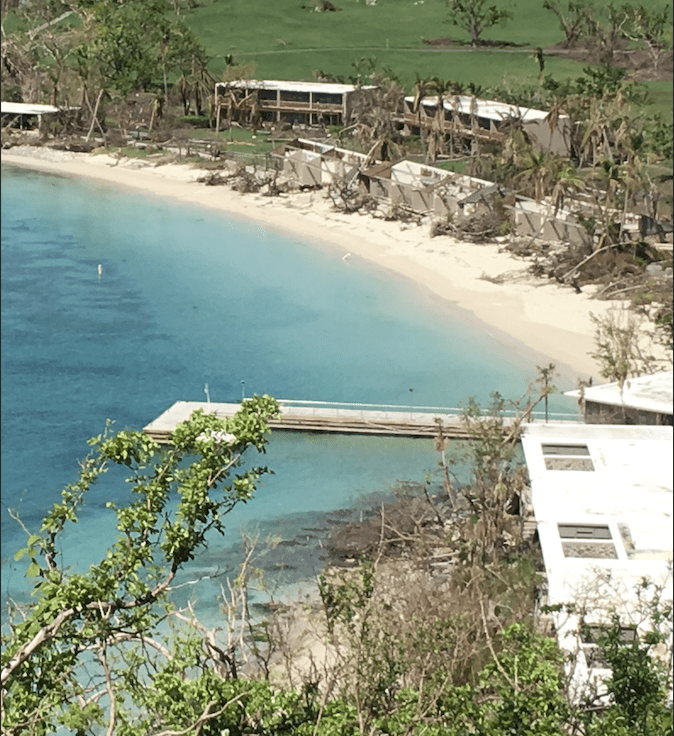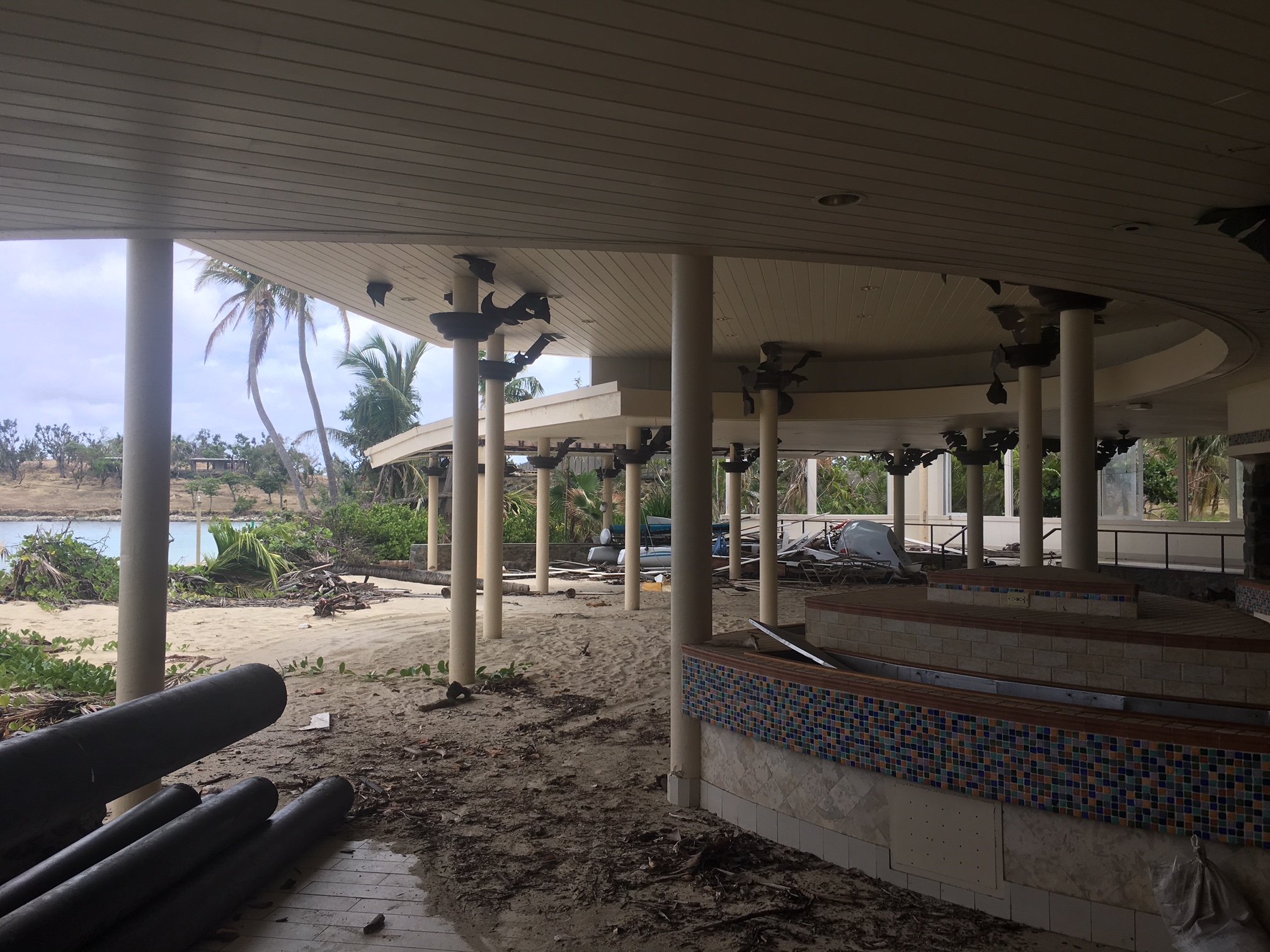
Caneel Bay operators EHI Acquisitions LLC and CBI Acquisitions have filed suit against the U.S. government to settle ownership of the resort, which closed after the 2017 hurricanes and, according to an EHI release, has been in limbo ever since.
“In its lawsuit, EHI announced plans to settle its ownership of the land, rebuild the resort and transfer ownership to a trust for the benefit of the people of St. John and V.I. community,” EHI said in a news release. “As the complaint describes, EHI’s efforts to rebuild … have been frustrated by failed negotiations with the United States.”
In 2019, EHI and CBI offered to transfer title to the buildings and other improvements to the resort to the U.S. government, which, according to the 26-page document, was declined.
“As a result, title to the land automatically reverted to EHI Acquisitions LLC. The United States, however, has refused to recognize that EHI Acquisitions has title to the property, and the United States continues to dispute that ownership. Plaintiff EHI Acquisitions brings this action to quiet title to the property,” according to the lawsuit.
“EHI’s lawsuit seeks to eliminate the cloud over its ownership of the land. Resolving EHI’s ownership is essential to its ability to raise the funds necessary to quickly rebuild the resort. EHI also announced in the complaint that it is creating a charitable trust for the benefit of the people of St. John and the Virgin Islands community and plans to donate the Resort property to the trust,” according to the release distributed by Patrick Kidd, the resort’s director of marketing, on Thursday afternoon.

The lawsuit cites language in the original 1983 Retained Use Estate agreement that can lead to the “premises,” including land, reverting if EHI gives one year’s notice of its intention to end the agreement, and makes “an offer … to convey and transfer … title in and to all improvements located on the Premises … .” The document does not mention whether this offer is to simply donate the land, or may include any specific dollar amount. A contract generally requires something of value to be given on both sides. The 1983 agreement itself conveys the land to the U.S. government “for and in consideration of One ($1.00) Dollar and other good and valuable consideration,” for example.
EHI is in effect arguing that the language of the Retained Use Agreement requires the U.S. government to accept any offer whatsoever, so long as there is an offer.
It asserts that once the resort is reopened, its operator will provide funds to the trust for local schools, affordable and work-force housing and environmental preservation.
In 1956, after purchasing over 5,000 acres of land on St. John, Laurance S. Rockefeller donated the vast majority of that land to the United States National Park Service, which was used to create the Virgin Islands National Park. But in that transfer, Rockefeller reserved approximately 150 acres, on which he built the resort (then called the “Caneel Bay Plantation”).
In 1977, Rockefeller divided ownership of the resort land and the resort’s buildings, facilities, and other improvements. Ownership of the land was transferred to Jackson Hole Preserve, Incorporated (“Jackson Hole”), and ownership of the improvements was retained by Caneel Bay, Inc., both Rockefeller-controlled entities.
On Sept. 30, 1983, Jackson Hole entered an Indenture with the United States, transferring title to most of the land on which the resort was located to the United States, acting by the secretary of the Interior through the director of the National Park Service. Rockefeller recognized, however, that it would be a mistake to transfer the resort itself to the United States, according to the suit. For that reason, the 1983 Indenture did not transfer to the United States the right to use and occupy the property and it did not transfer ownership of the resort’s improvements.
The 1983 Indenture instead reserved to Jackson Hole a “retained use estate,” in which Jackson Hole retained “the exclusive right to use and occupy” the property. Jackson Hole transferred title only to “the land, including the landscaping, walkways, roads, road systems, and automobile parking areas,” “but exclusive of all other improvements thereon.”
The stated term for the retained use estate was 40 years, which would end on Sept. 30, 2023. But, for the resort operator to have sufficient financial incentive to continue to make improvements, the operator would need a mechanism to be reimbursed for the value of the improvements at the end of the term. As a solution, Rockefeller included a mechanism in the 1983 Indenture providing that any time after three years — 1986 or later — the owner of the retained use estate could submit an offer to transfer the improvements to the United States along with one year’s written notice terminating the retained use estate on a specified date. If the United States accepted the offer, the owner would then execute and deliver to the United States an instrument conveying title to all improvements.
The suit argues “EHI Acquisitions made an ‘offer to provide the full conveyance and transfer of fee title in and to all Improvements’ to the United States in consideration for ‘payment of the sum certain of $70 million,’ and an agreement that the United States would release and indemnify Caneel Bay from environmental liabilities related to the Resort, other than for contamination caused by Caneel Bay.”
According to the lawsuit, if the United States was not willing to accept the offer, title to the land would “revert, automatically and without further deed” to the owner of the retained use estate. The 1983 agreement uses the term “premises,” which includes both structures and land.
EHI argues in its suit that this mechanism assured that the resort operator would at all times have, and never lose, the financial incentive to properly maintain the improvements and the resort.
“The U.S. Department of the Interior and the U.S. National Park Service (collectively, the United States) have called into question Caneel Bay’s ownership of the land upon which the resort sits, and have refused to provide assurances that, if Caneel Bay rebuilds the resort, it will be permitted to operate it. This, in turn, has made it impossible for Caneel Bay to secure the funding needed to quickly rebuild the Resort. A declaration from this Court that the land belongs to Caneel Bay is necessary to eliminate the cloud on the title, and to allow Caneel Bay to restore the resort,” the lawsuit says.
In its release, EHI said that in rebuilding, it would also:
• Open a cultural heritage center on the resort;
• Appoint senior managers who know and respect the Virgin Islands people and culture;
• Invest in education including high school and university-level courses in hotel management for local residents;
• Protect and preserve the natural environment, and conduct a cleanup of the resort land; and
• Incorporate more hurricane-resistant design and construction.
“The people of St. John ultimately want to see the resort open again, and to know that its owner is committed to supporting the Virgin Islands,” said Kidd. “EHI goes a step further with its commitment to rebuild the resort and return the land to the Virgin Islands people.”
The suit is filed in the District Court of the Virgin Islands, Division of St. Thomas and St. John. Read the complaint here.





